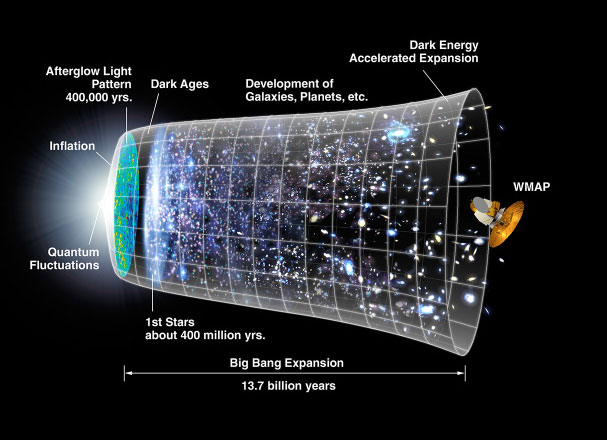Introduction
Asteroids
Gamma Ray Explosions
Expansion of the Universe
Our Sun
References

Expansion of the Universe

Picture showing The Big Bang Expansion theory
The Big Rip is a a well known hypothesis about the ultimate fate of the Universe, stating that the matter of the universe, from stars and galaxies to atoms and subatomic particles, are being progressively torn apart by the expansion of the universe.

Picture showing The Big Rip theory
If dark energy density increases with time, the universe begins to not just accelerate and expand but super accelerate, meaning the rate of acceleration is perpetually increasing. This super accelerated expansion of space-time would exert a stretching force on all galaxies, stars and atoms in the universe. As it increases with strength, every bound structure in the universe will eventually be ripped apart.
First, the galaxies would be separated from each other. This is what is happening right now, with galaxies that move outside the observable universe (approximately 46.5 billion light years away).
About 60 million years before the end, gravity would be too weak to hold the Milky Way and other individual galaxies together. Approximately three months before the end, the Solar System will be gravitationally unbound. In the last minutes, stars and planets will be torn apart, and an instant before the end, atoms will be destroyed. The authors of this hypothesis calculate that the end of the universe as we now know it would be approximately 35 billion years after the Big Bang, or 20 billion years from now.

Picture showing The Big Crunch theory
An alternative outcome of our universe due to expansion would be the Big Crunch, the hypothesis that the universe will eventually collapse upon itself after the expansion stops - a contrast to the Big Bang theory which begun our universe.
It states that if the gravitational attraction of matter within the observable horizon were high enough, the expansion of the universe would gradually slow down and then reverse eventually. The universe would then contract with about the same time span as the expansion. Eventually all matter and energy would be compressed back to a gravitational singularity.
However recent experiments namely the observation of distant supernovae has shown that the universe isn't being slowed down by gravity but accelerating as mentioned above and will not end with a Big Crunch but expand forever.
But one thing remains certain; that either of these events will indefinitely result in the end of our Earth.
Videos
Video showing The Expansion of the Universe (Part 1)
Video showing The Expansion of the Universe (Part 2)